 |
Exhibit of "Treasures from Jean Gray Hargrove Music Library" at the 44th California International Antiquarian Book Fair in San Francisco, February 11-13, 2011. Exhibit curated by John Shepard; images courtesy Katherine Canfield Shepard. |
|
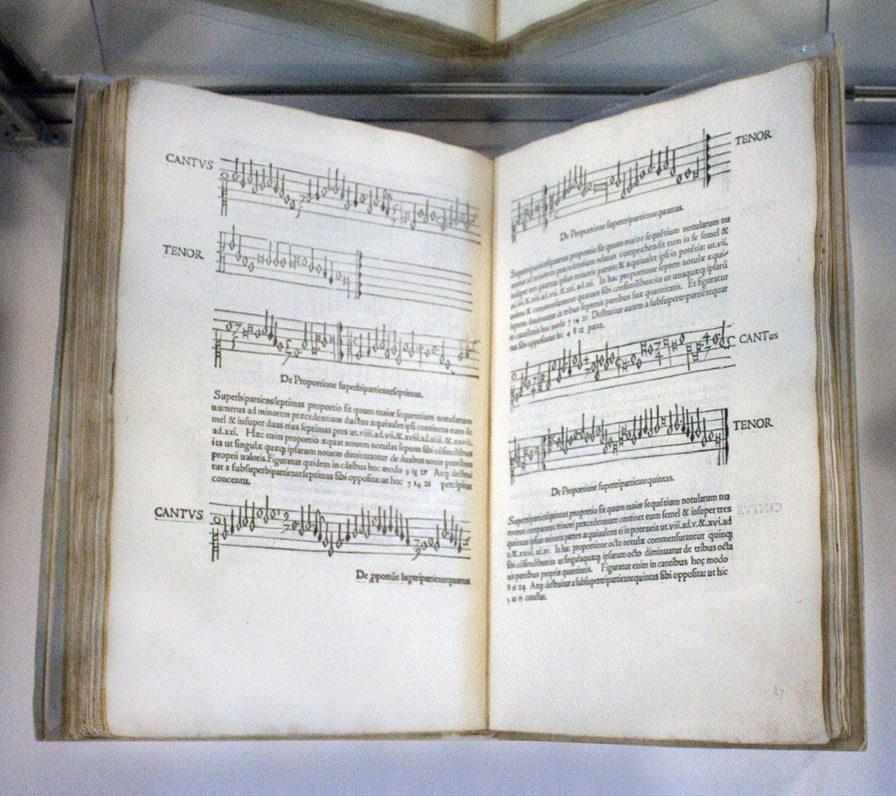 |
Franchinus Gaffurius (1451-1522). Practica musicae (Brescia, 1502)
While the text of this treatise was printed from type, the musical examples were printed from carved woodblocks. |
|
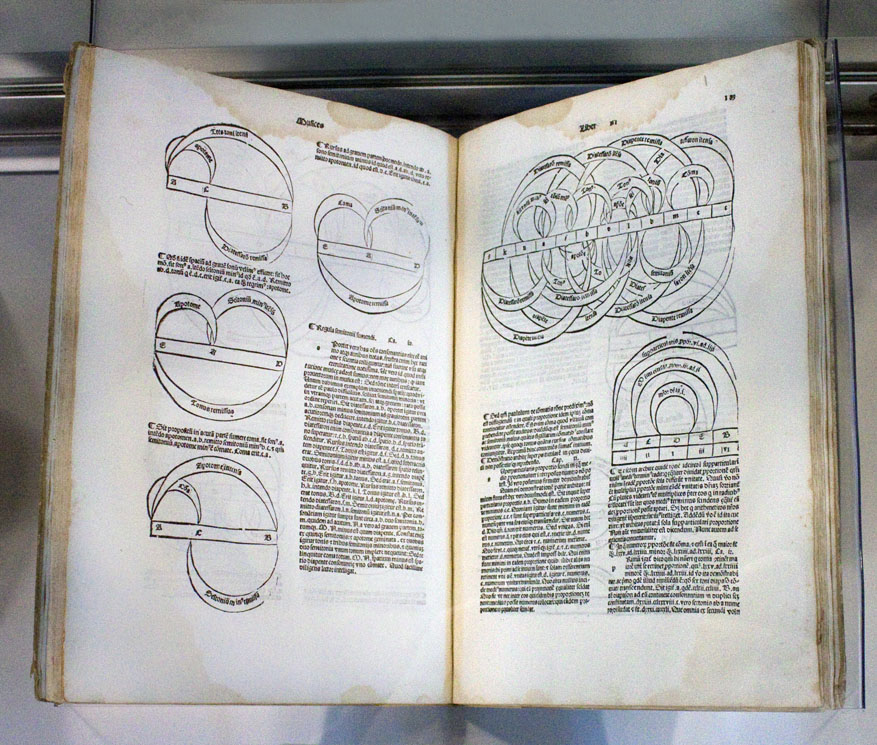 |
Boethius (died 524). Opera: Arithmetica geometria et musica Boetti (Venice: Joannes and Gregorius de Gregoriis de Forlivio, Aug. 18, 1492)
The writings of the Roman Boethius informed much of the teaching of music theory in the Middle Ages and Renaissance. His works treat music as one of the four mathematical disciplines of antiquity (the others being arithmetic, geometry, and astronomy). The precise date of the printing of this treatise may be found in the colophon at the very end of the book. |
|
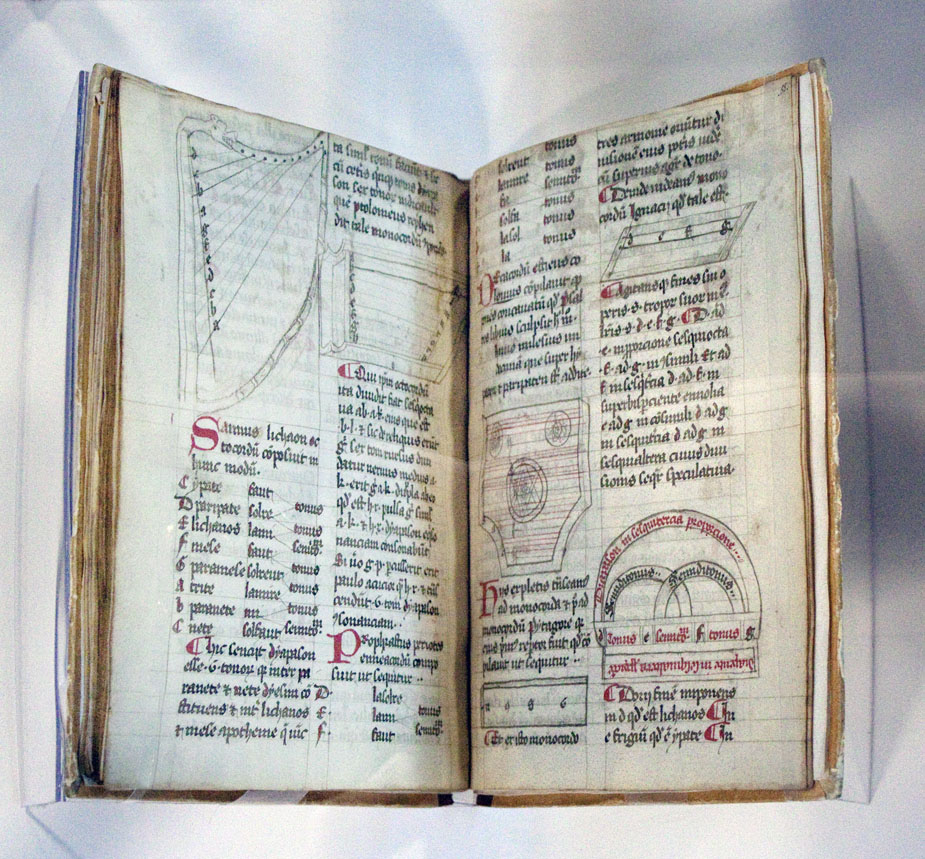 |
[The Berkeley Theory Manuscript] (January 12, 1375)
This manuscript of 14th-century music theory contains several treatises on chant, counterpoint, notation, and tuning, among other topics. |
|
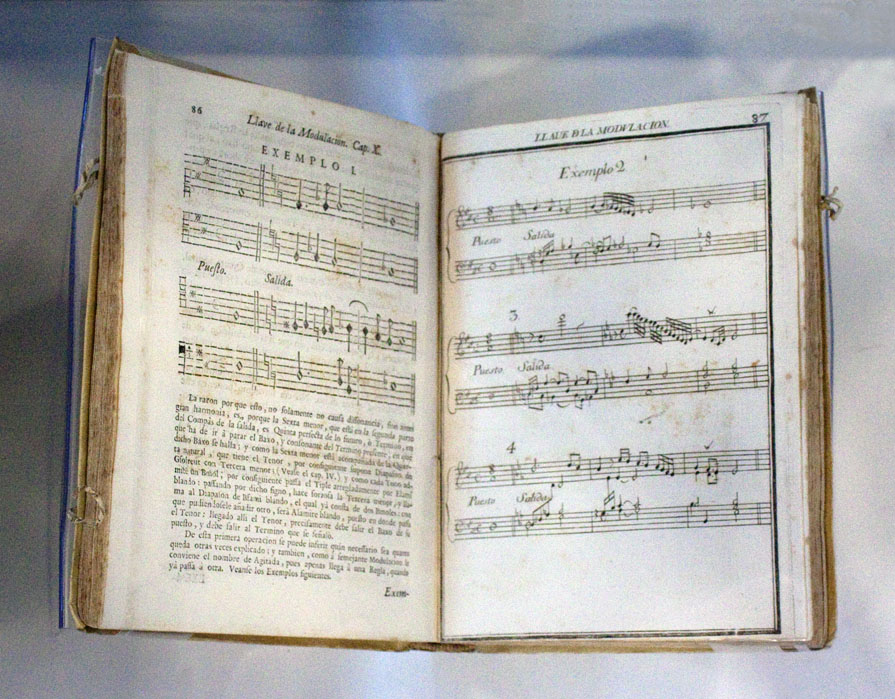 |
Antonio Soler (1729-1783). Llave de la modulacion (Madrid: J. Ibarra, 1762).
Frederick Marvin wrote that in this book “Soler illustrates how to modulate smoothly from any major or minor key to any other of the 24 keys in the fewest number of bars.” |
|
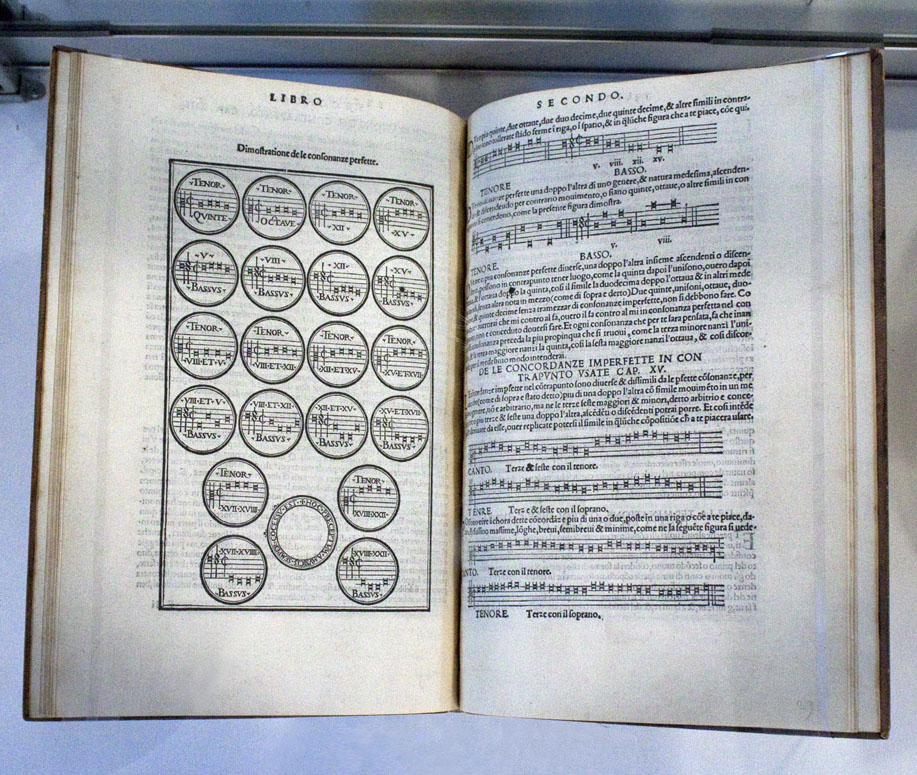 |
Pietro Aaron (ca. 1480-after 1545). Toscanello in musica (Venice, 1539)
Toscanello in musica is one of the earliest music treatises in the vernacular: it was written in the language spoken by Pietro Aaron’s countrymen, rather than in Latin. |
|
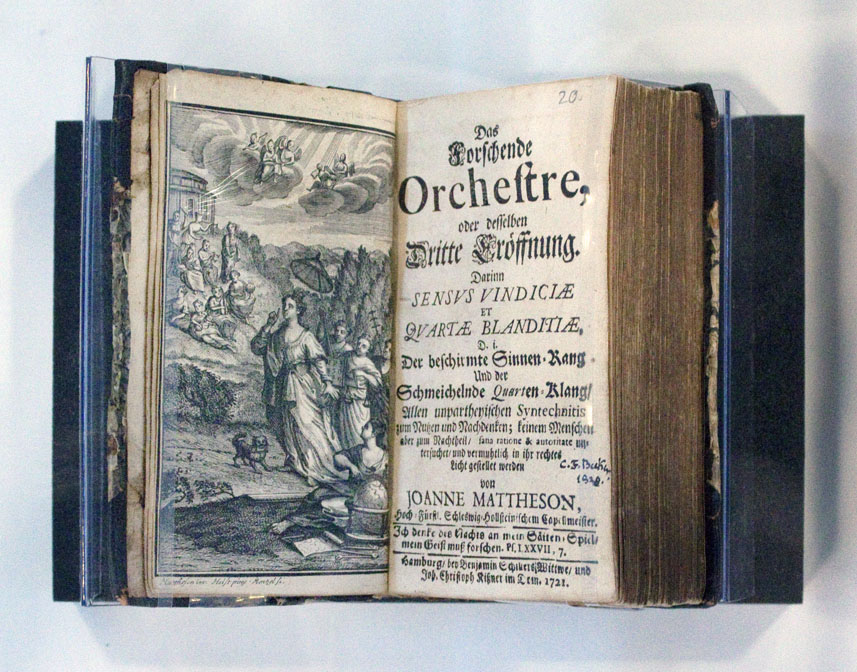 |
Johann Mattheson (1681-1764). Das forschende Orchestre (Hamburg: Schiller & Kissner, 1721)
Mattheson’s several treatises on music have been noted for their original thinking and their rejection of music theory inherited from classical antiquity. |
|
 |
Nicola Matteis (flourished 1672-1699). Ayres for the Violin (London, 1685-1687). The Neapolitan Nicola Matteis became England’s foremost virtuoso on the violin, an instrument that was just beginning to find popularity in the British Isles at the time of this publication. |
|
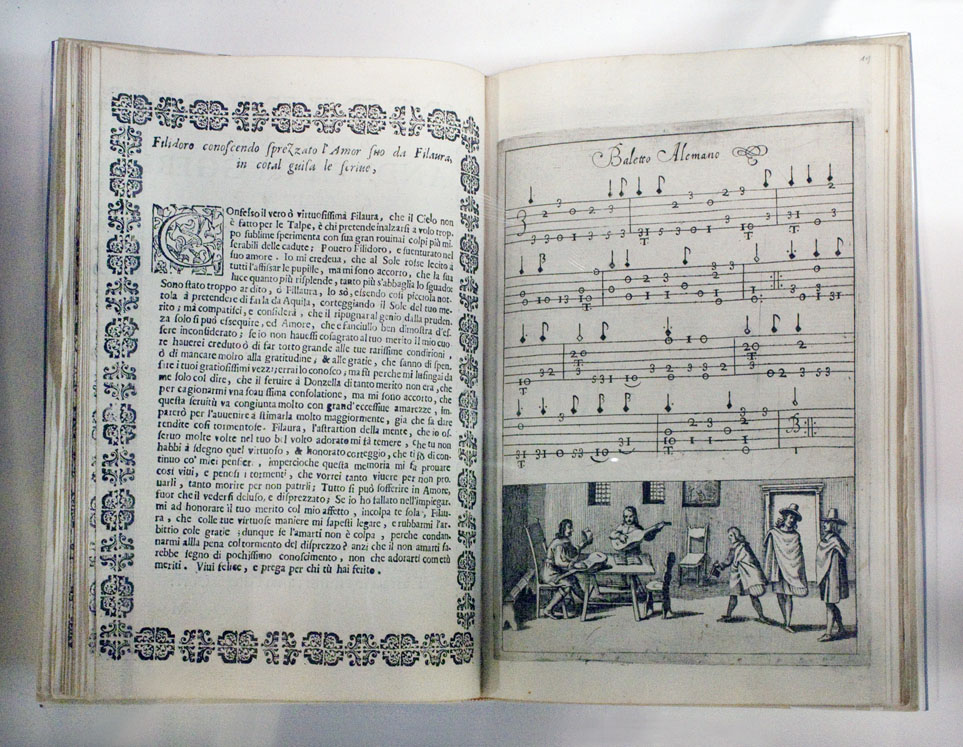 |
Stefano Pesori. Lo scrigno armonico: opera secondo ove si rinchiudono vaghissime danze, & ariette al modo italiano, spagnolo, e francese; per suonare in cencerto con basso, violino, manacordo, & altri instrumenti : et molte vaghissime villanelle, con l'instavolature della chitarra spagnola. (Verona[?], 1648[?]). | |
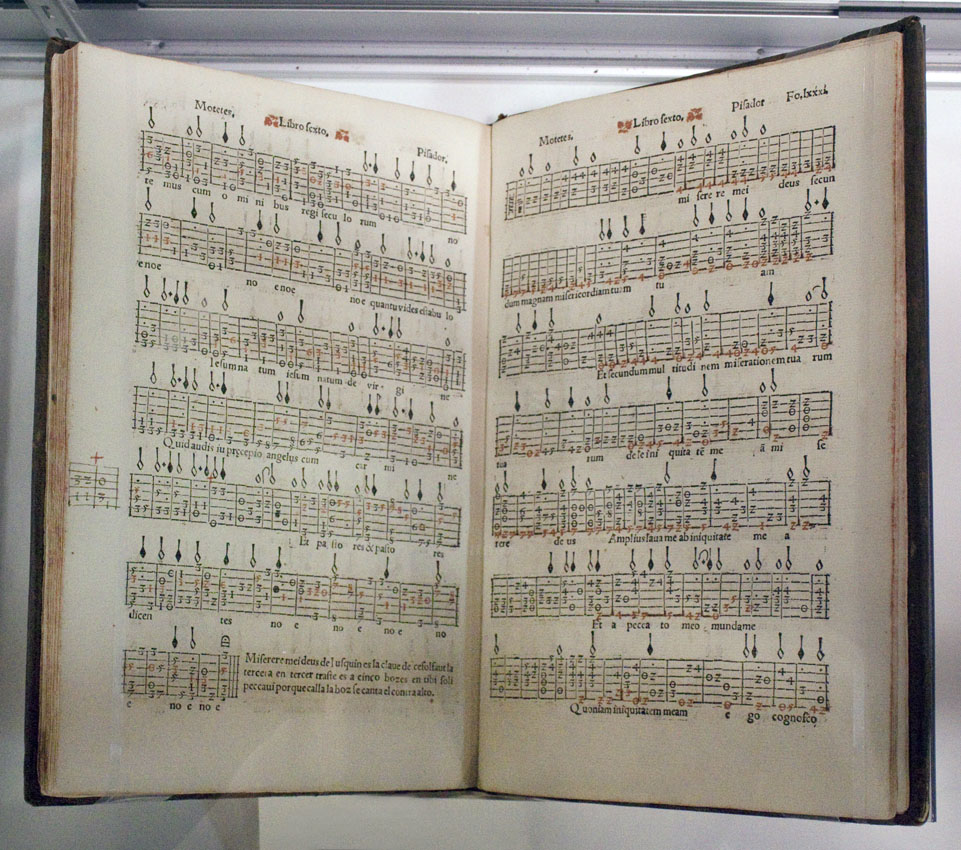 |
Diego Pisador (b. 1510). Libro de musica de vihuela (Salamanca: [author], 1552)
This tablature book for vihuela—a precursor of the guitar—includes transcriptions of motets, originally composed for voices a cappella. The notation in red indicates to the vihuela player the cantus firmus (underlying chant melody) to be highlighted. |
|
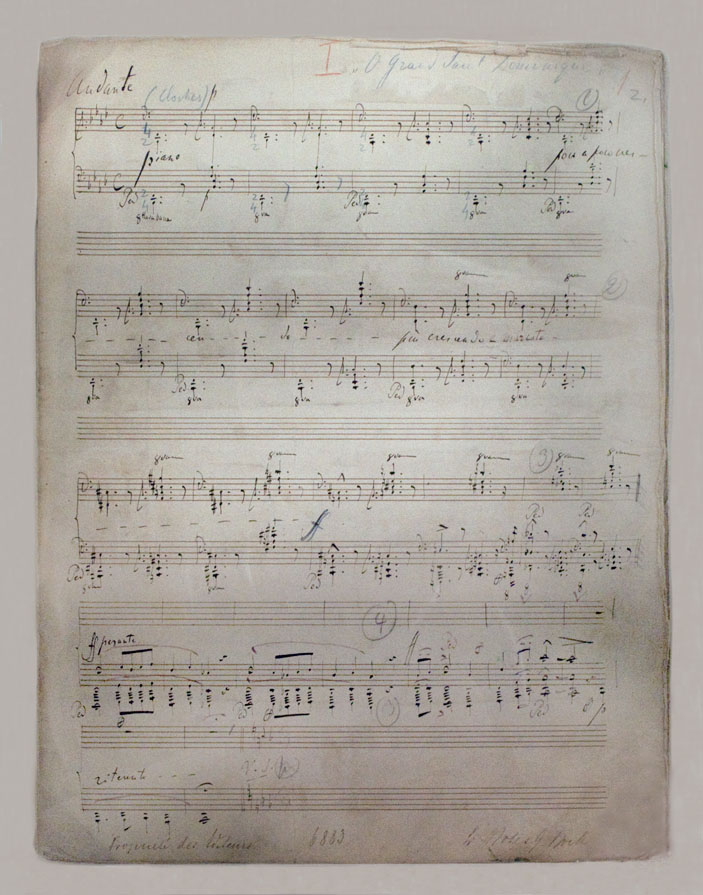 |
Franz Liszt (1811-1886). Illustrations de l’opéra L’Africaine de G. Meyerbeer.
Liszt’s autograph manuscript, from which the edition, below, was prepared. |
|
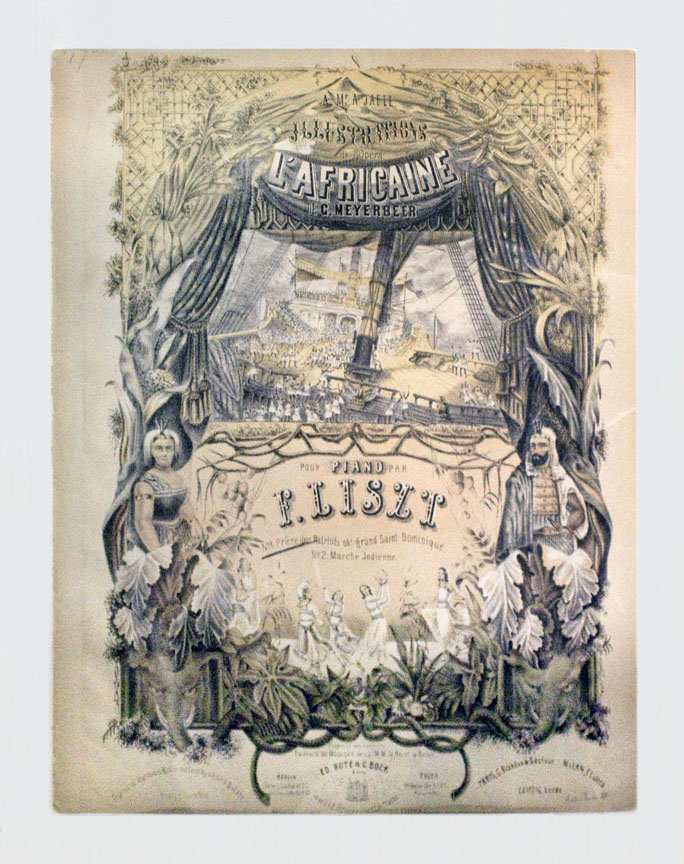 |
Franz Liszt (1811-1886). Illustrations de l’opéra L’Africaine de G. Meyerbeer; pour piano par F. Liszt (Berlin : Bote & Bock, [1866]).
This edition of a transcription for piano of the “Sailors’ Prayer” from the opera L'Africaine by Giacomo Meyerbeer is displayed with Liszt’s autograph manuscript, above, from which the edition was prepared. |
|
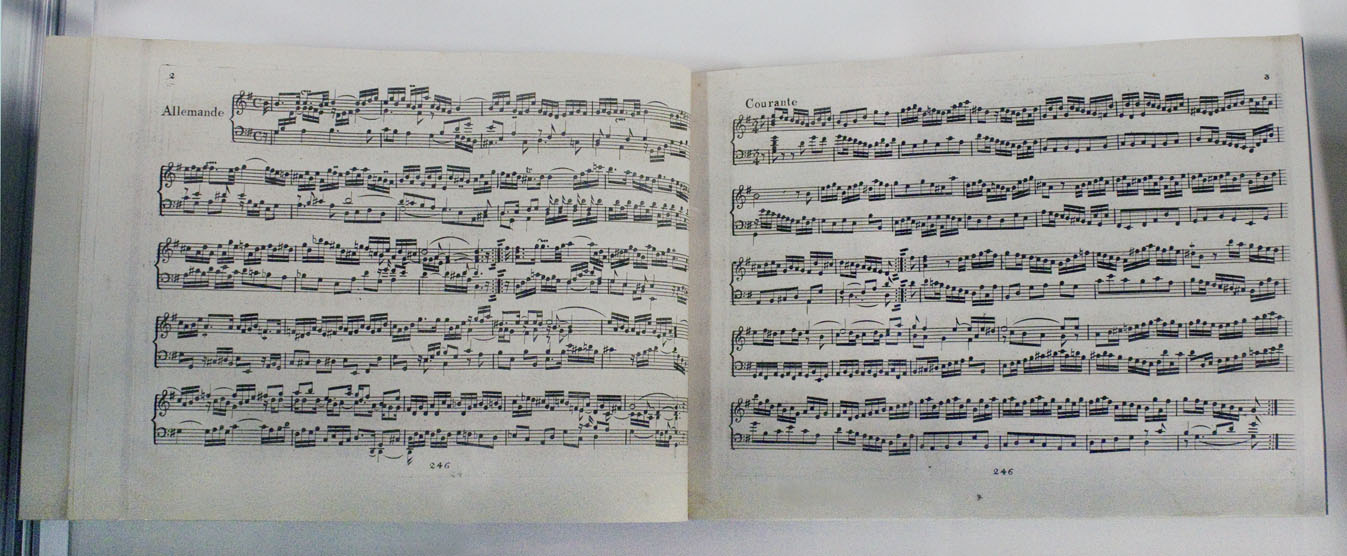 |
Johann Sebastian Bach (1685-1750). VI Suites pour le clavecin (Leipzig: Hoffmeister & Kuhnel, 1803).
First edition of Bach’s French Suites for keyboard. On display is the beginning of the fifth suite in G major, BWV 816. |
|
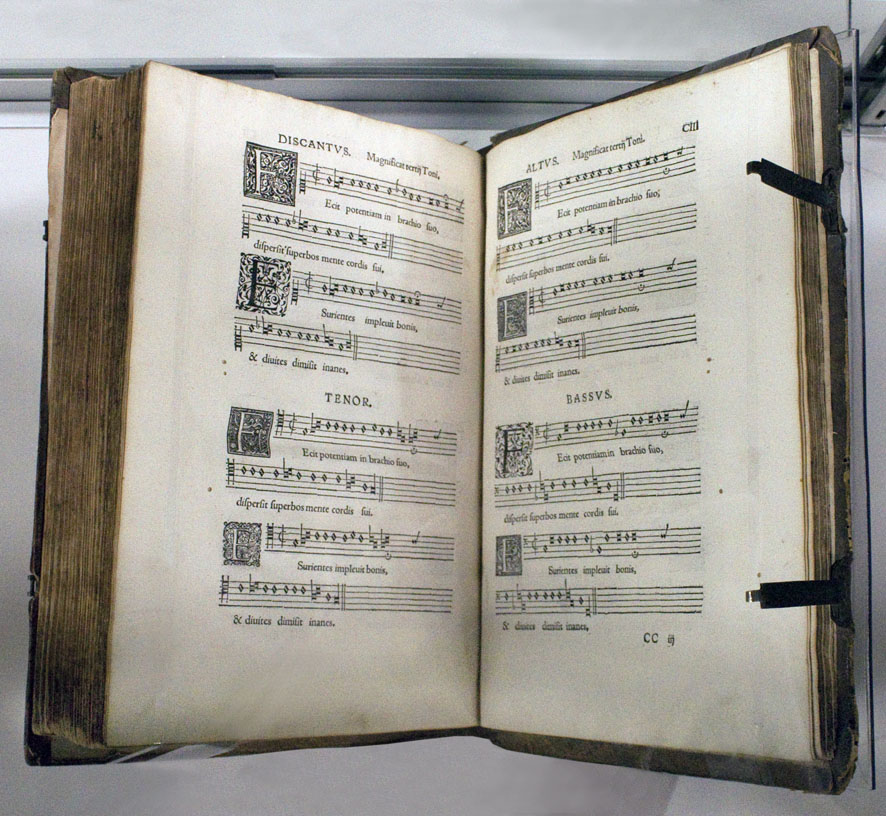 |
Kirchenordnung (Nuremberg: Dietrich Gerlatz, 1570)
This book on Lutheran liturgy concludes with a section titled Kirchengesang, featuring both the tunes of chorales with German texts and a Latin Magnificat in choirbook format. The volume has its original tooled leather binding with clasps. |
|
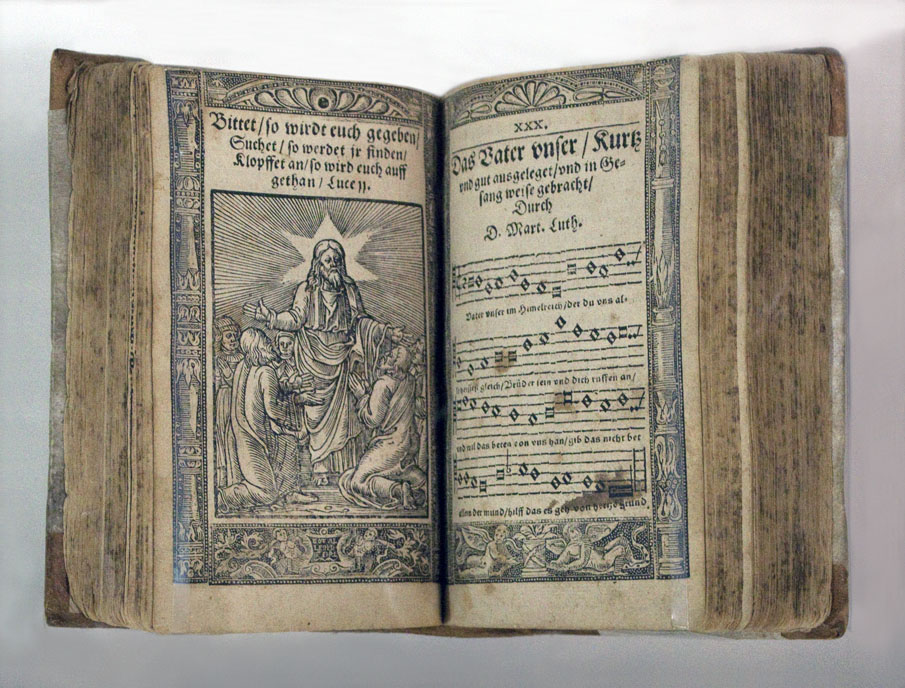 |
Martin Luther (1483-1546). Geistliche Lieder: mit einer newen Vorrede (Leipzig: Jacob Berwald, 1557)
In this edition, the musical notation was printed from type, while the decorative borders are woodcut. |
|
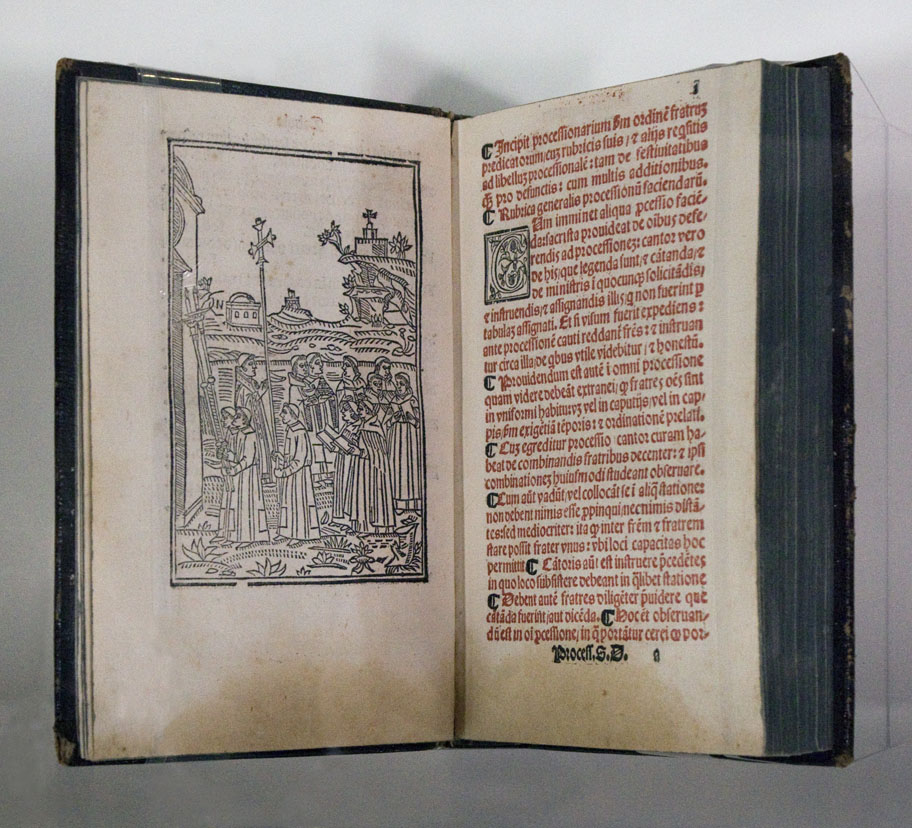 |
Processionarium secundum ritum et morem fratrum predicatorum (Venice: successors of Lucantonio de Giunta, 1545) | |
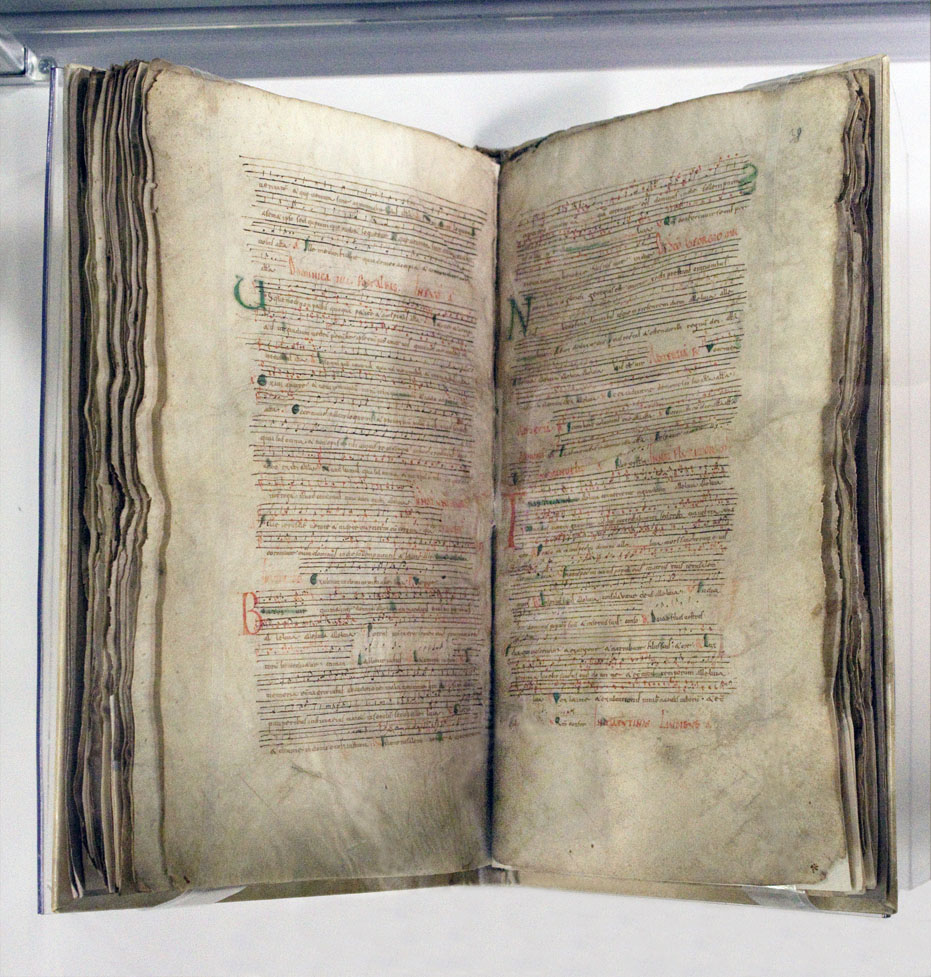 |
The Wolffheim Antiphonal (named for its owner before 1930, Dr. Werner Wolffheim), a Gregorian chant manuscript originating from the region of Nevers, France, third quarter of the 11th century | |
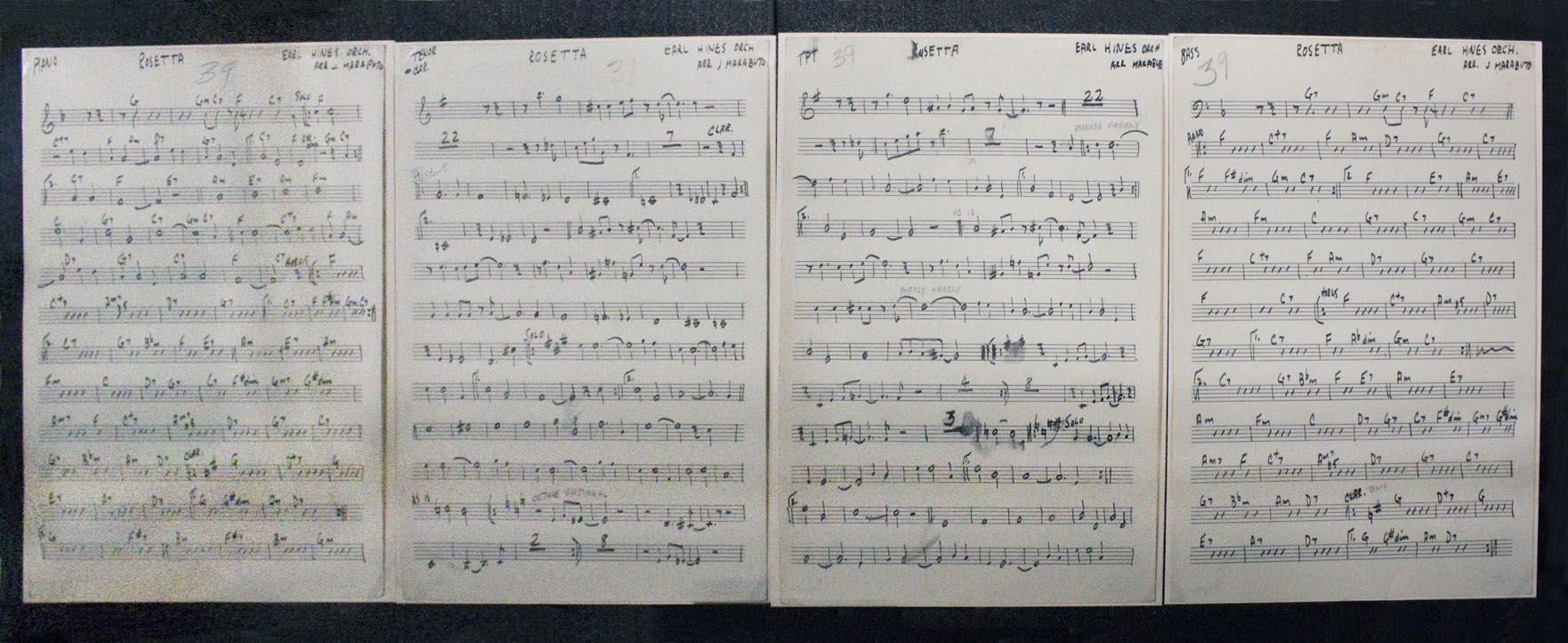 |
Charts for Earl Hines' composition "Rosetta" from the Earl "Fatha" Hines Collection | |
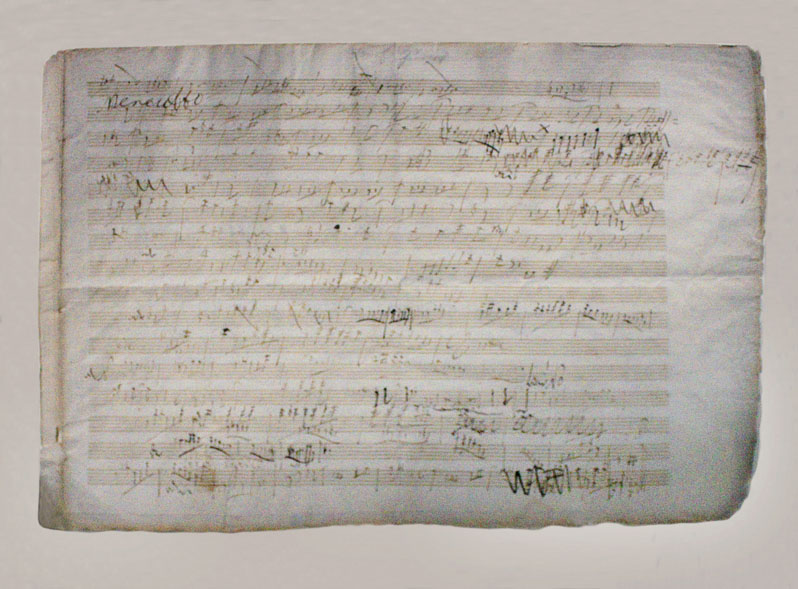 |
Ludwig van Beethoven (1770-1827). Sketch for the Scherzo of his String Quartet Opus 18, number 6 (around 1799) | |
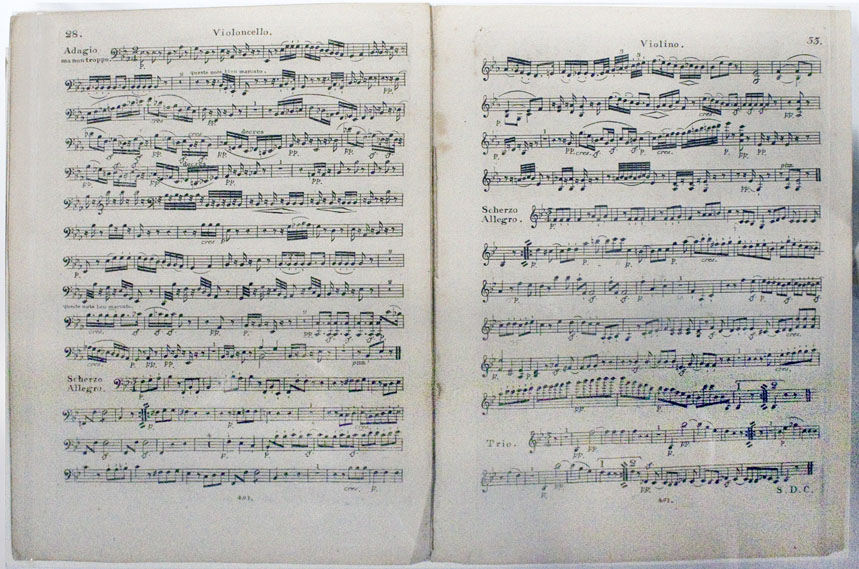 |
Ludwig van Beethoven (1770-1827). Six grandes sonates pour le piano-forte, violon obligé et violoncelle ad lib : oeuvre 60 [i.e. 18], no. VI. (Bonn: Simrock, [1806])
Before the advent of recorded sound, arrangements and transcriptions were a popular means of enabling hearings of new works. This arrangement of Beethoven’s Sixth String Quartet for piano trio allowed for performances when a second violin and viola were not available. |
|
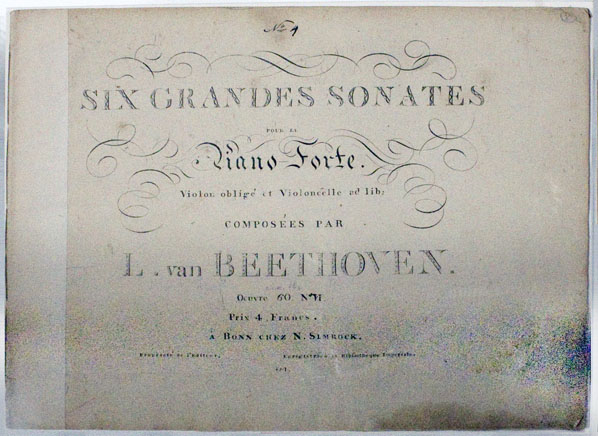 |
Ludwig van Beethoven (1770-1827). Six grandes sonates pour le piano-forte, violon obligé et violoncelle ad lib : oeuvre 60 [i.e. 18], no. VI. (Bonn: Simrock, [1806])
Before the advent of recorded sound, arrangements and transcriptions were a popular means of enabling hearings of new works. This arrangement of Beethoven’s Sixth String Quartet for piano trio allowed for performances when a second violin and viola were not available. |
|
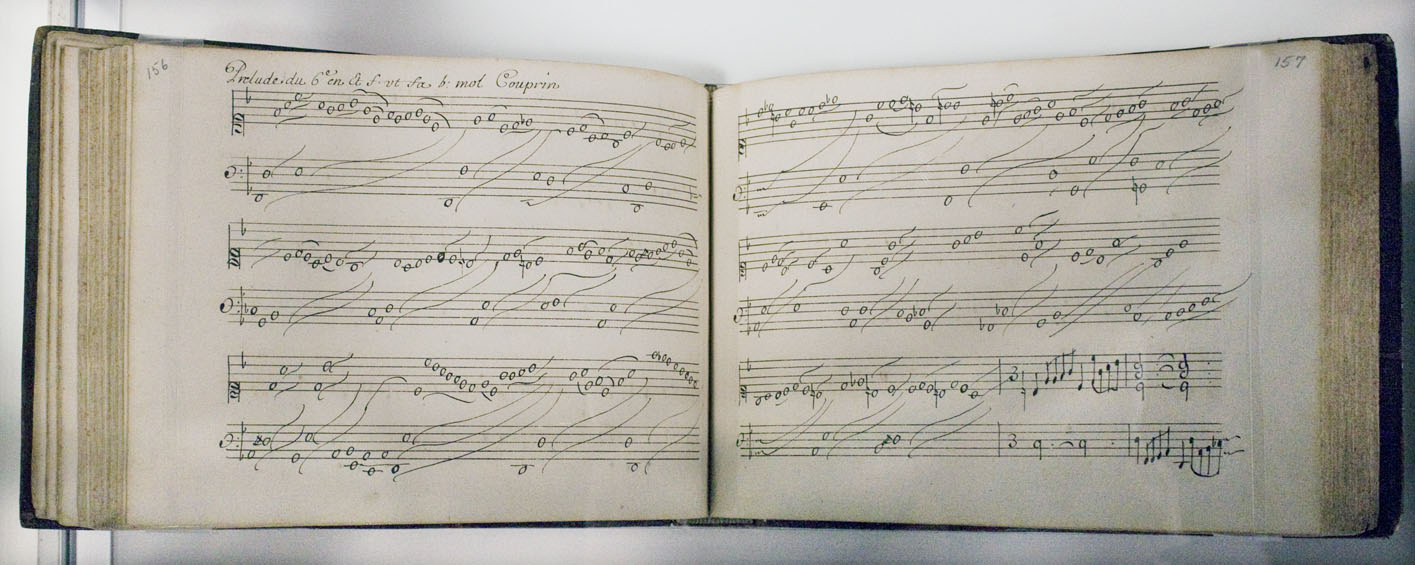 |
The Parville Manuscript (copied 1686-1700) One of more than a dozen manuscripts of French baroque harpsichord music in the Hargrove Music Library, the Parville Manuscript contains suites and other pieces by D'Anglebert, Chambonnières, Louis Couperin, La Barre, and Lully, among other composers, both identified and unidentified. |
|
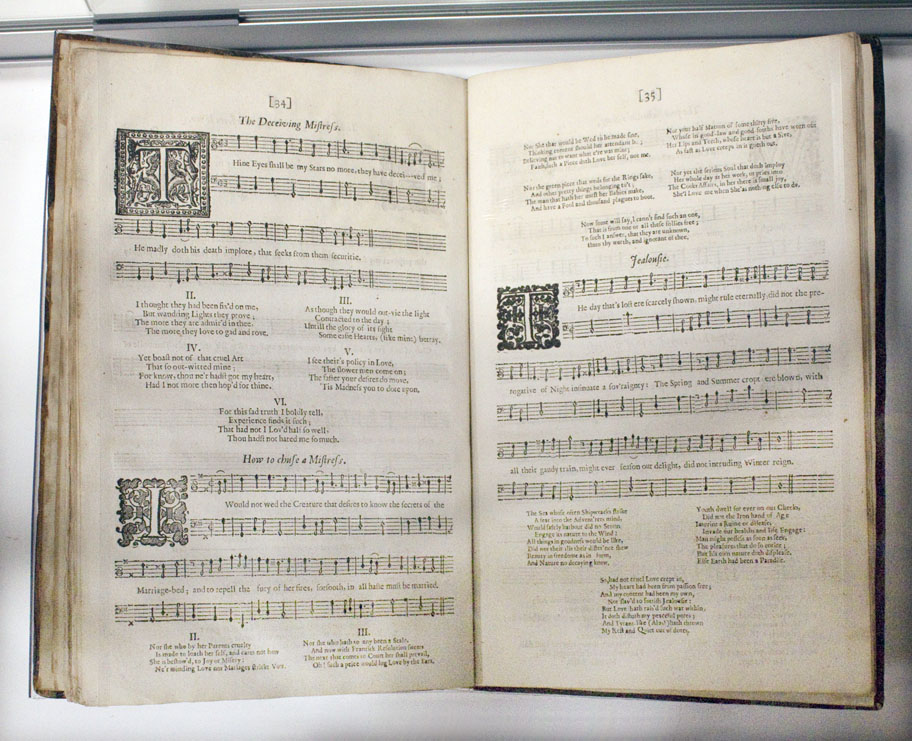 |
John Gamble (died 1687). Ayres and Dialogues: for One, Two, and Three Voyces, To Be Sung either to the Theorbo-Lute or Basse-Viol ... The Second Book (London : printed by W. Godbid for Nathaniel Ekin, 1659) | |
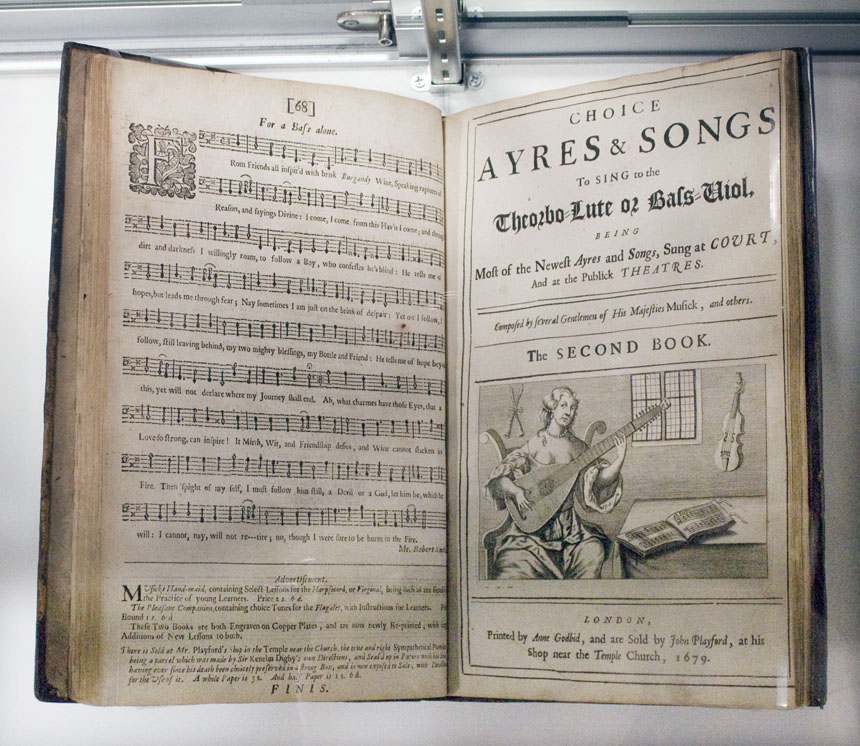 |
Choice Ayres & Songs: To Sing to the Theorbo-Lute or Bass-Viol , Being Most of the Newest Ayres and Songs, Sung at Court, and at the Publick Theatres (London : printed by W.G. [for] John Playford and John Ford, 1673-1684.) | |
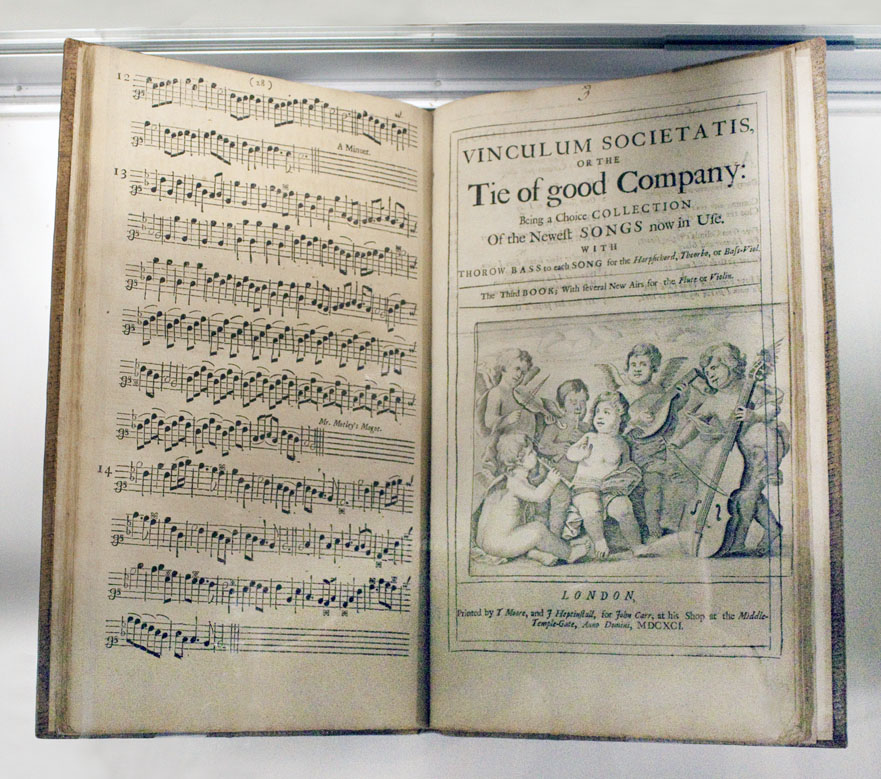 |
Vinculum societatis, or, The Tie of Good Company: Being a Choice Collection of the Newest Songs Now in Use, with Thorow Bass to Each Song for the Harpsichord, Theorbo, or Bass-Viol (London: Printed by F. Clark, T. Moore and J. Heptinstall, for John Carr, and Sam. Scott, 1687-1691.)
With this edition, John Heptinstall introduced tied notes (eighth and sixteenth notes grouped together) to the printing of music from movable type. |
|
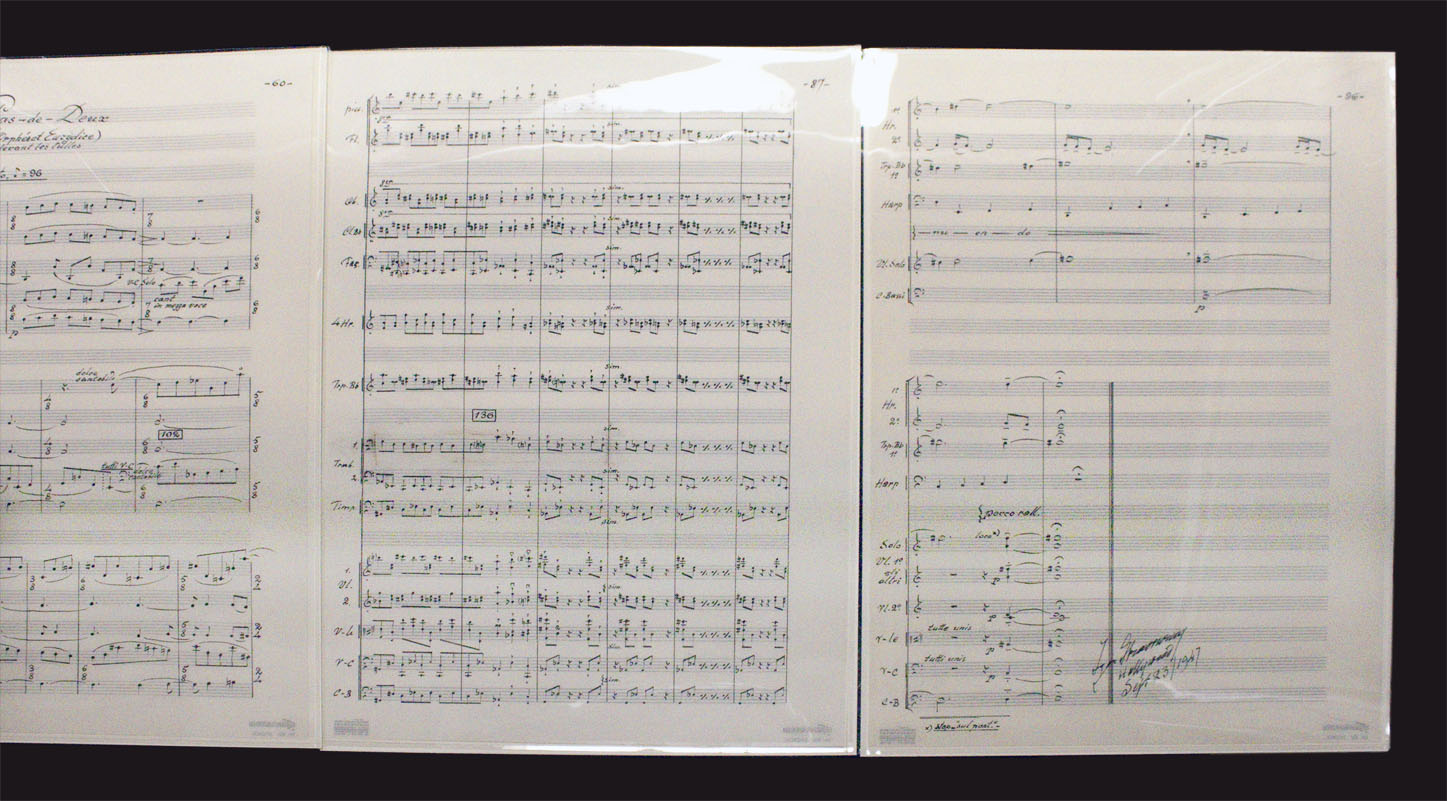 |
Igor Stravinsky (1882-1971). Orpheus. Autograph manuscripts, 1947.
Stravinsky copied both the full orchestral score of his ballet and the short score onto ozalid transparencies. Stravinsky probably copied the short score for the use of the rehearsal pianist while George Balanchine was teaching his choreography for Orpheus to his dancers. |
|
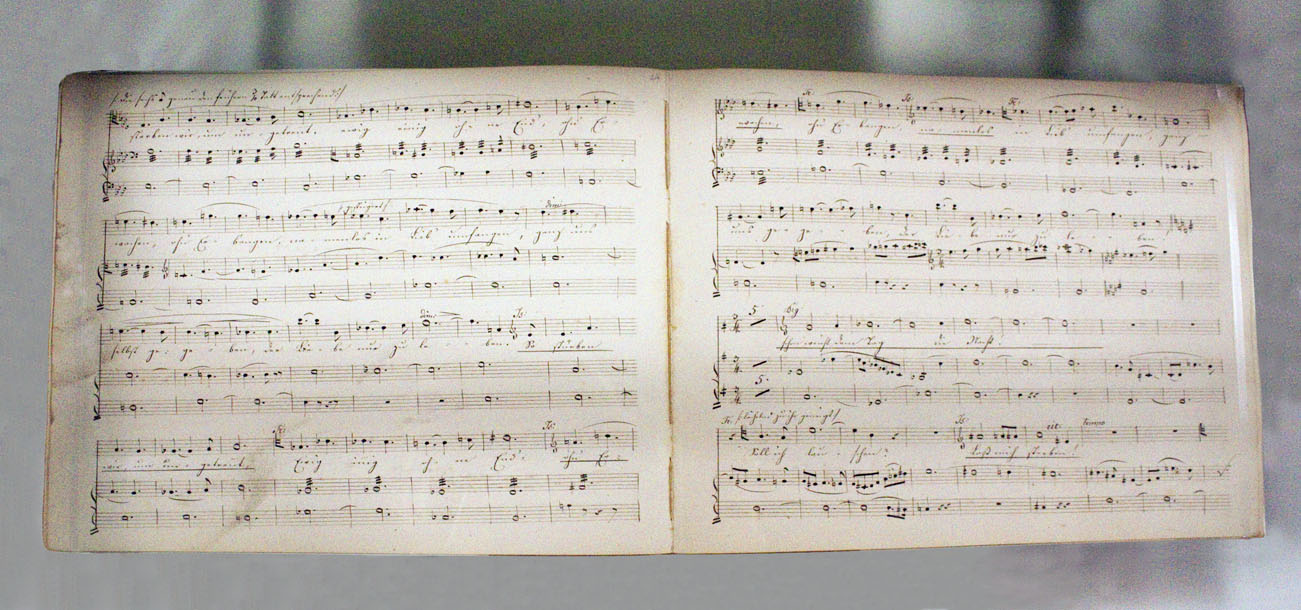 |
Richard Wagner (1813-1883). Tristan und Isolde (scribal copy, 186-?)
This part for the role of Tristan was copied for the use of Ludwig Schnorr von Carolsfeld (1836-1865), who created the role in the premiere, which took place on 12 June 1865. Schnorr von Carolsfeld died of a mysterious ailment a little more than five weeks later. |
|
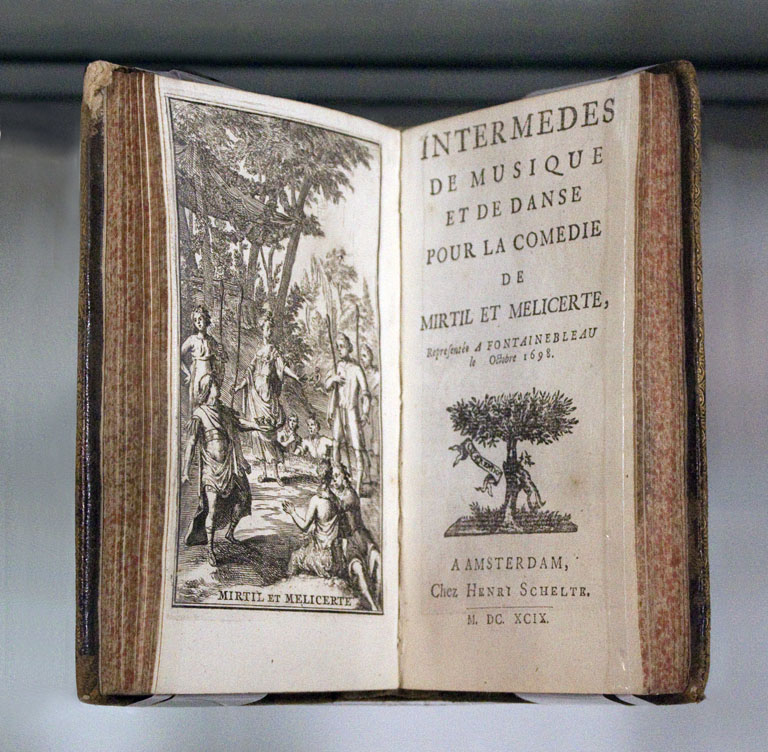 |
Intermedes de musique et de danse pour comedie de Mirtil et Melicerte, representée à Fontainebleau le octobre 1698. (Amsterdam: Henri Schelte, 1699) | |
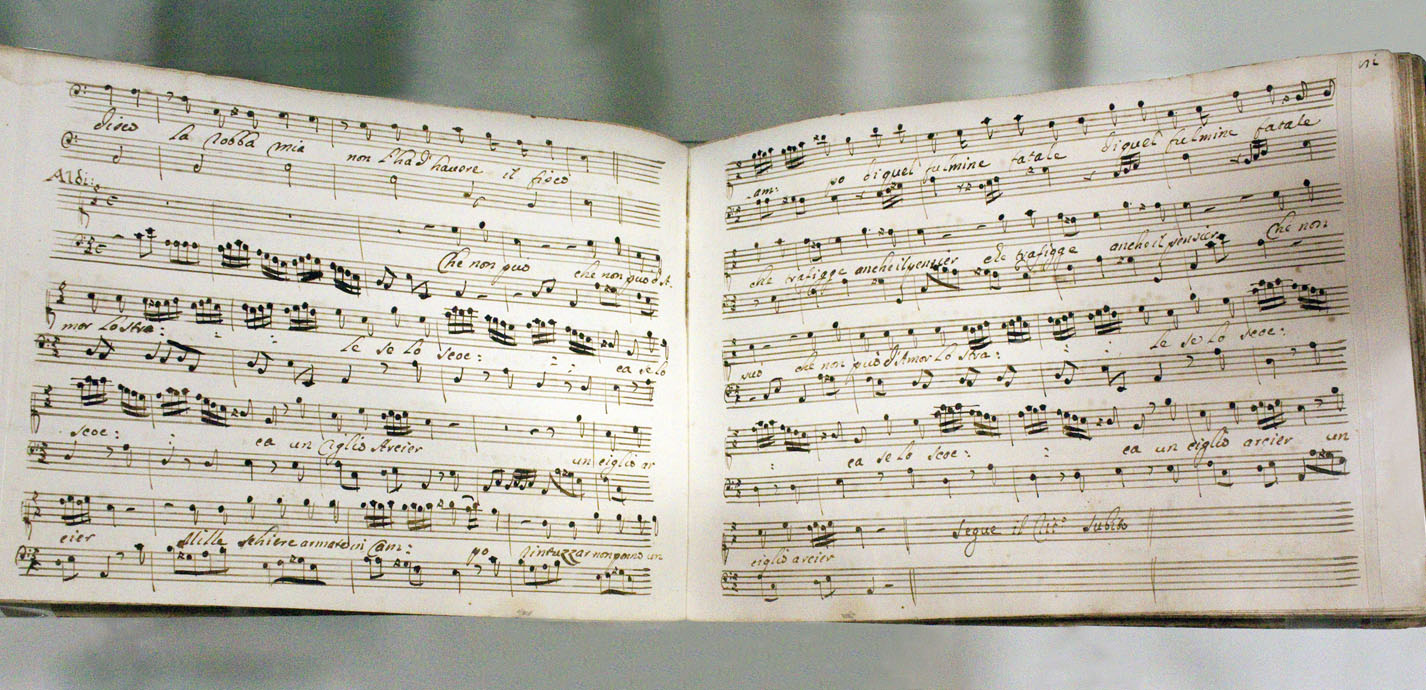 |
Alessandro Scarlatti (1660-1725). L’Aldimiro, o vero favor per favore [1683]. Manuscript full score of opera (18th century?).
For many years, this opera was known from the existence of its printed libretto, but the score was presumed lost until 1989, when Dr. John Roberts—Head of Cal’s Music Library—identified this manuscript. The library had owned it for some time, but because of a missing title page it was thought to be a score by an anonymous composer. |
|
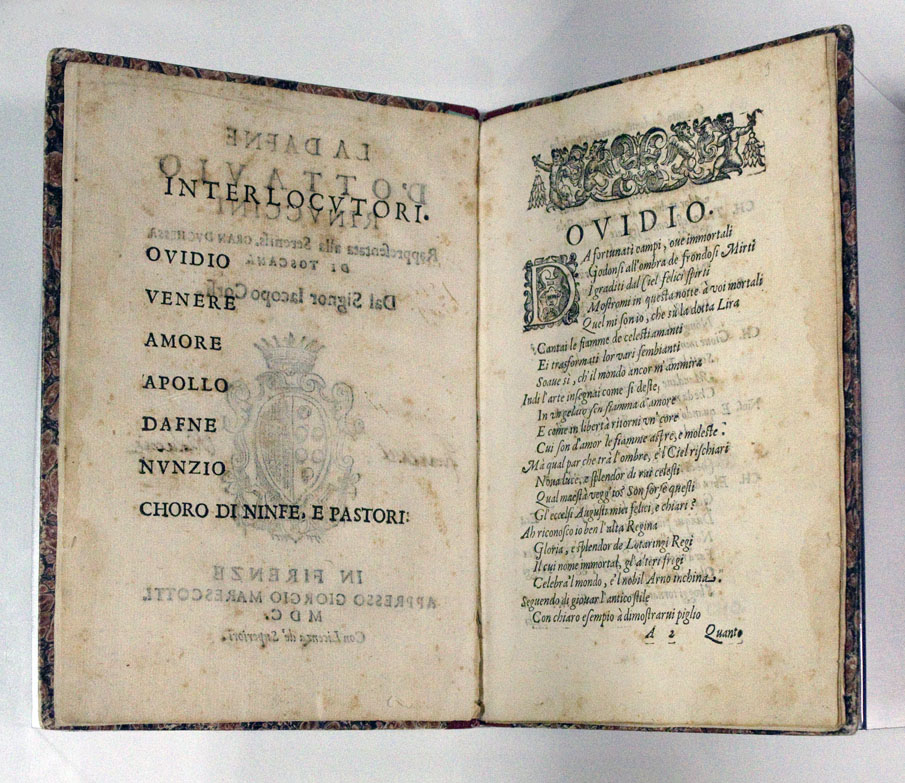 |
Jacopo Peri (1561-1633). La Dafne d'Ottavio Rinuccini ; rappresentata alla sereniss. gran dvchessa di Toscana dal signor Iacopo Corsi (Florence: Appresso Giorgio Marescotti, 1600). Taddei Libretto Collection | |
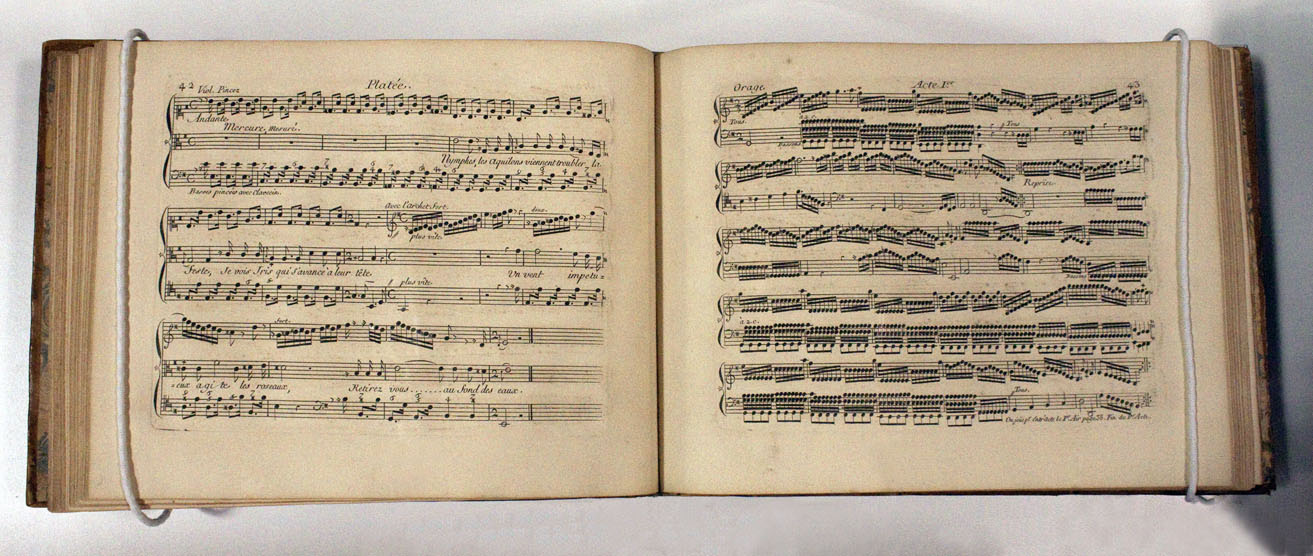 |
Jean-Philippe Rameau (1683-1764). Platée: Comedie-ballet (Paris: chez l'auteur, La veuve Boivin [et] M. Leclair, [ca. 1749])
The “ballet bouffon” Platée was first performed at Versailles in 1745 on the occasion of the dauphin’s wedding. This edition was prepared on the occasion of the work’s revival at the Paris Opéra. |
|
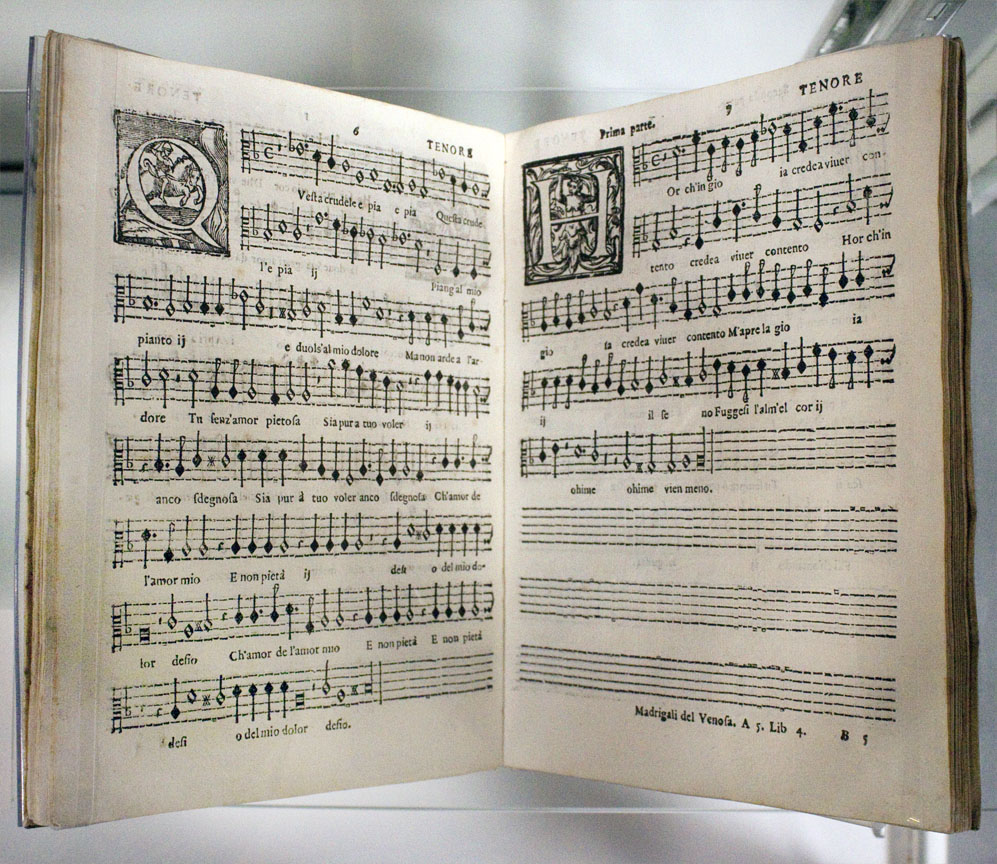 |
Carlo Gesualdo, principe di Venosa (ca. 1560-1613). Madrigali a cinque voci:libro primo [-sesto] (Venice & Gesualdo, 1604-1611).
Tenor parts from editions printed in Venice by Angelo Gardano and in Gesualdo by Giovanni Giacomo Carlino, bound together in one volume. |
|
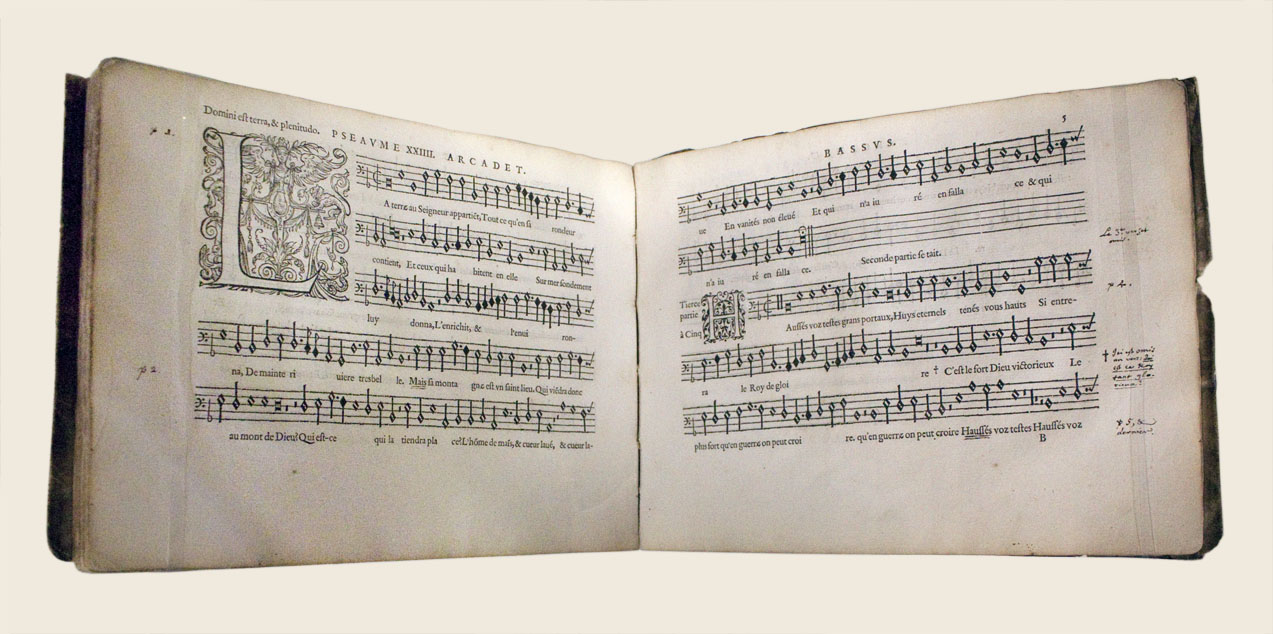 |
Jacob Arcadelt (ca. 1505-1568). Six psalmes de David composes en musique au long (en forme de motetz) a quatre & cinq parties par M. Iaques Arcadet (Paris: Le Roy & Ballard, 1559) | |
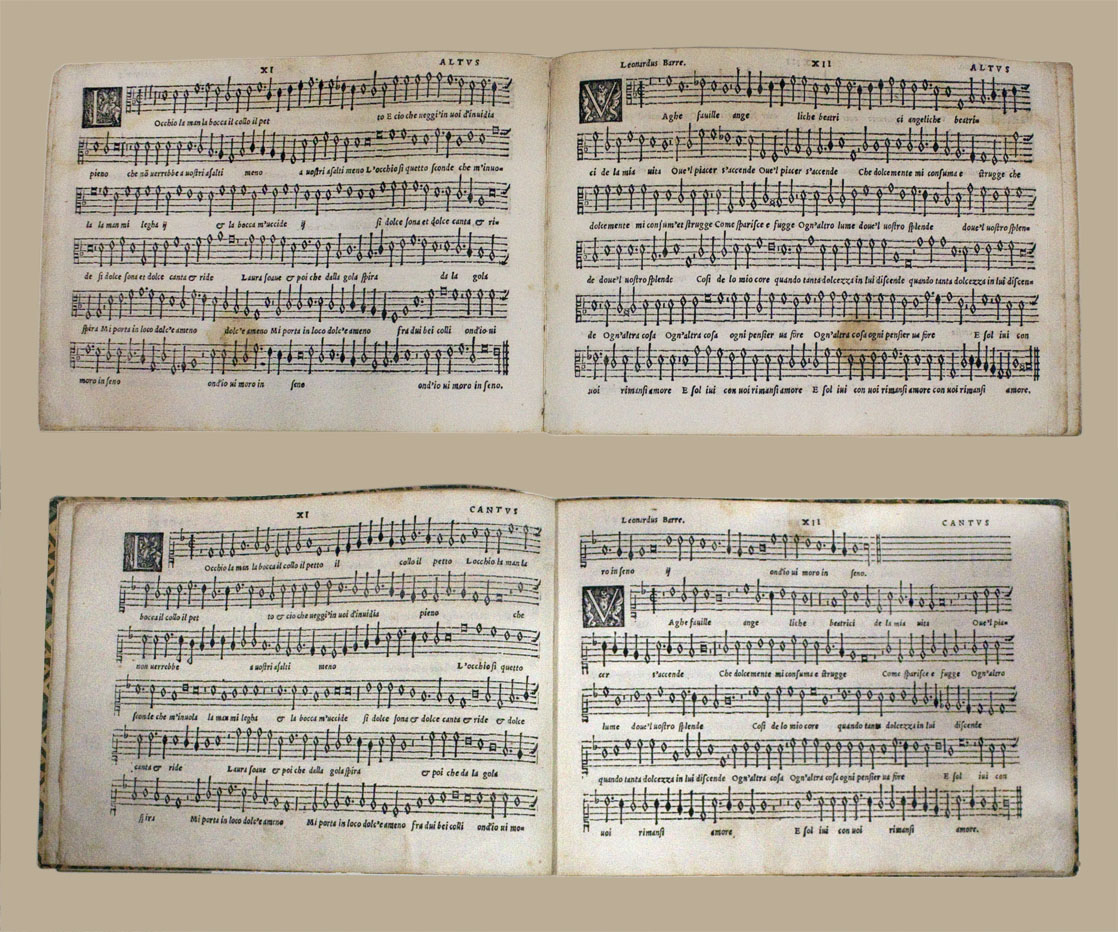 |
Cipriano de Rore (1515 or 1516-1565). Il secondo libro de madregali, a cinque voci (Venice: Antonio Gardano, 1544)
The Hargrove Music Library acquired the cantus part from this edition fifty years after the altus. |
|
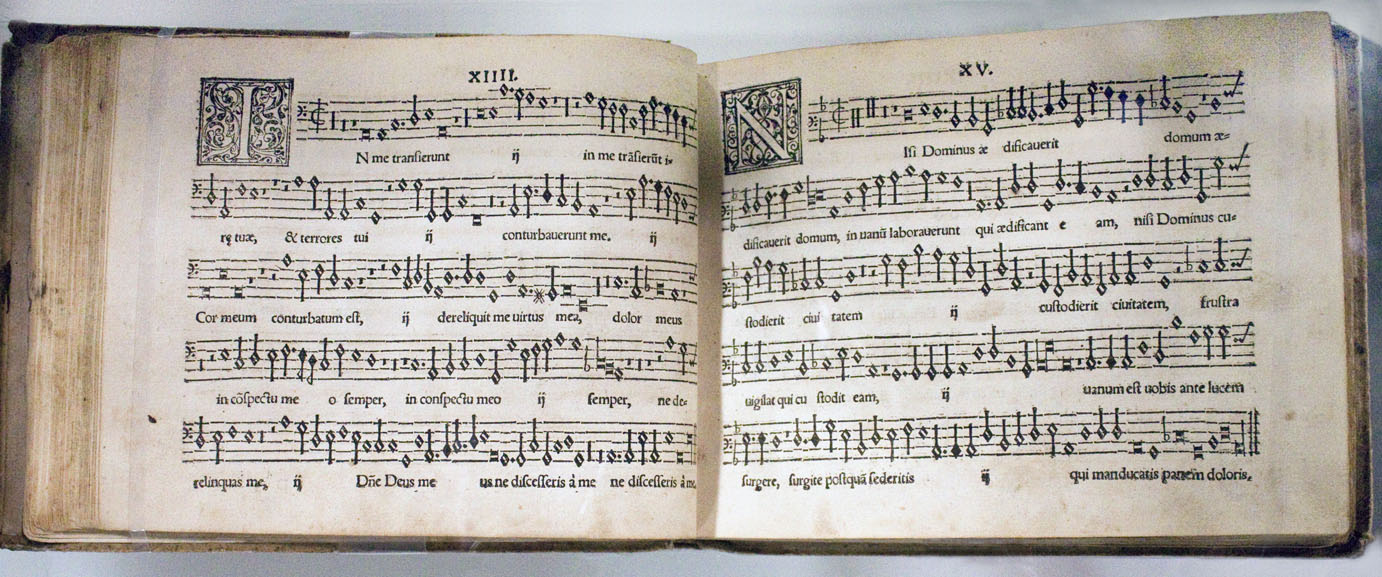 |
Orlando di Lasso (1532-1594). Sacrae cantiones (Nuremburg: Berg & Neuber, 1564).
This bass part for Lassus motets is bound with bass parts for other motet editions, with manuscript bass parts written in the back of the volume. |
|
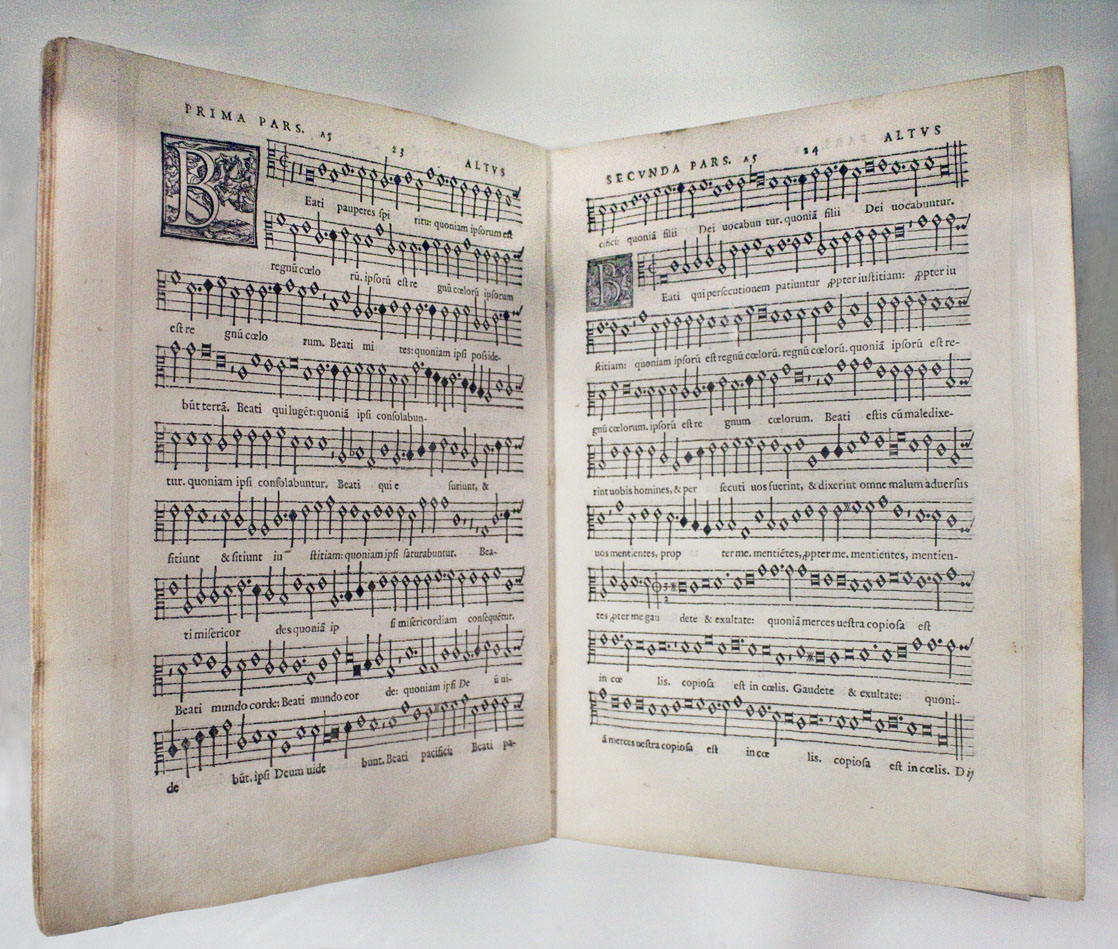 |
Adrian Willaert (1490?-1562). Musica nova (Venice: Antonio Gardano, 1559) | |
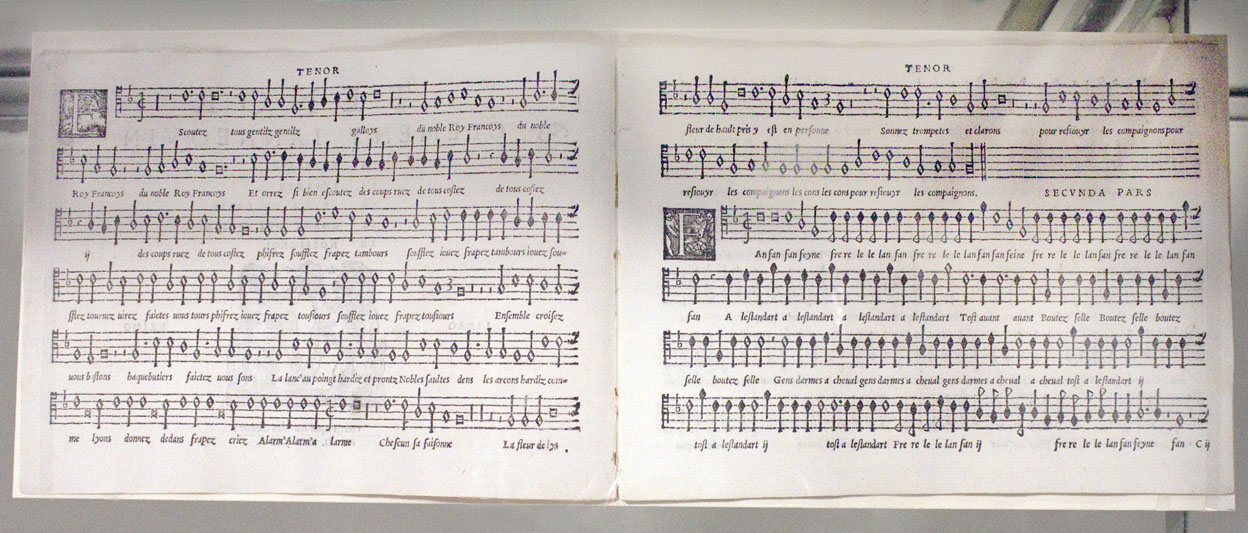 |
Clement Janequin (ca. 1495-1560). La bataglia, La louette, Le critz de Paris ; Le chant des oyseaux ; Le rossignol (Venice: Antonio Gardano, 1545). | |
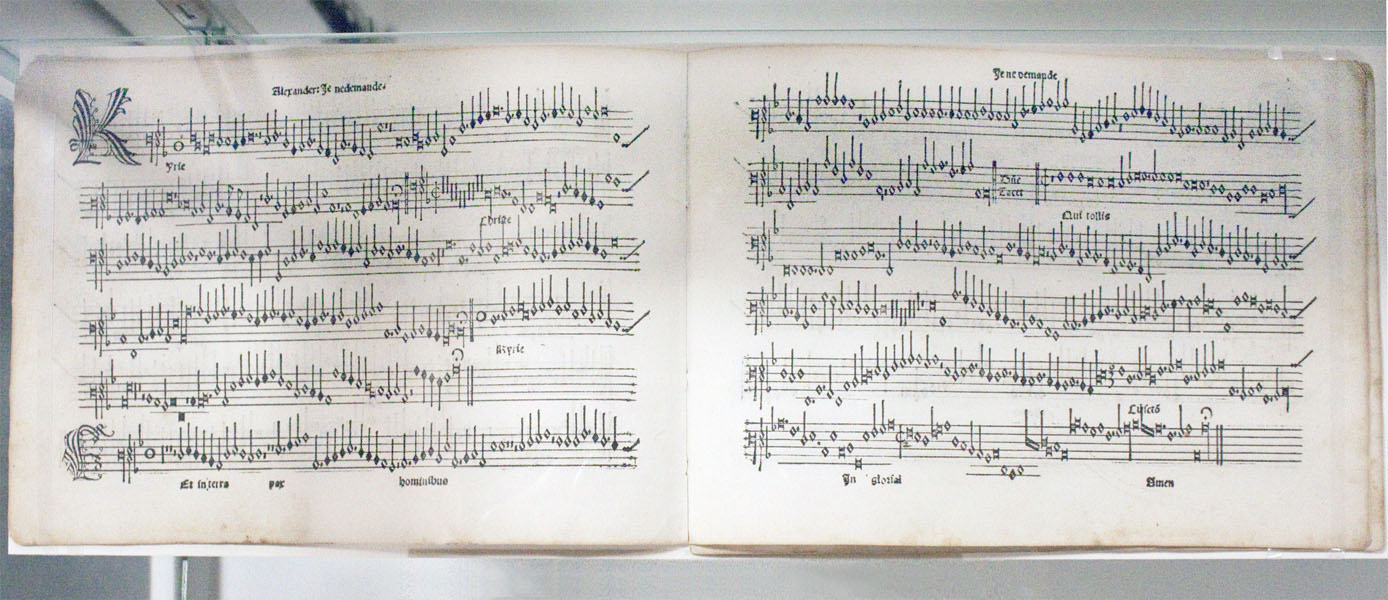 |
Alexander Agricola (1446?-1506). Misse (Venice: Ottaviano Petrucci, 1504). Part book for tenor voice. Ottaviano Petrucci printed the first music from movable type in 1501. He printed in three impressions: first, the staves; next, the text, initial letters, and signatures; and finally, the notes. The result is notable both for its accuracy and its elegant appearance. |
|